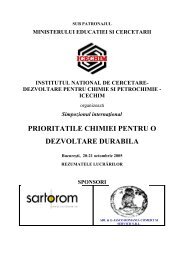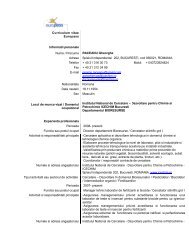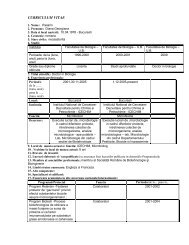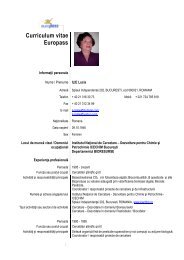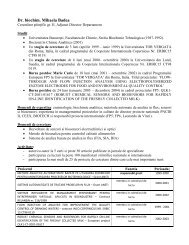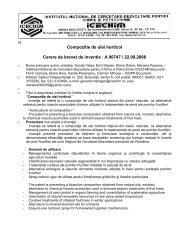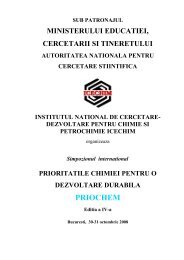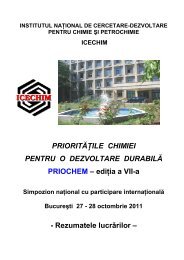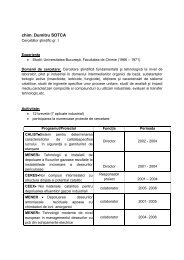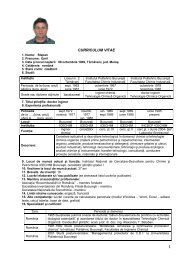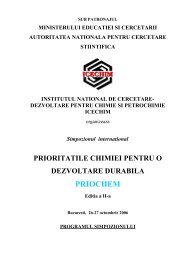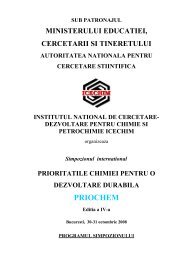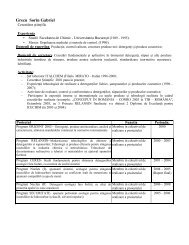INSTITUTUL NAÅ¢IONAL DE CERCETARE-DEZVOLTARE - ICECHIM
INSTITUTUL NAÅ¢IONAL DE CERCETARE-DEZVOLTARE - ICECHIM
INSTITUTUL NAÅ¢IONAL DE CERCETARE-DEZVOLTARE - ICECHIM
- No tags were found...
You also want an ePaper? Increase the reach of your titles
YUMPU automatically turns print PDFs into web optimized ePapers that Google loves.
4 - Protection and Environmental Engineering - PELECTROCHEMICAL BEHAVIOUR OF HEAVY METAL COMPLEXCOMPOUNDS AT THE WASTE WATER TREATMENTOlga COVALIOVAUniversity of the Academy of Sciences of Moldova, 3/2 Academiei Street, Chisinau, MD 2028,Republic of MoldovaTel: +37322577556; E-mail: Covaleva.Olga@yahoo.comTo prevent the heavy metals and other toxic ions release in natural environment due tothe discharges of untreated plating and rinsing solutions is an important problem from bothecological and economical viewpoint. It is crucial to avoid the environmental pollution anduncontrolled losses of resources. Today treatment technologies are not always efficient andcost saving and sometimes they can even provoke the secondary pollution. Electrochemicaltreatment of industrial waste waters is among the most promising technologies as it impliesthe same principles as the main technologies and does not require introducing of anyadditional chemicals into the treated solution. However, till now this method was giveninsufficient attention.The electrochemical behaviour of some d-metal complexes was studied and discussedfrom the point of view of waste water treatment requirements. Studies performed in the modelplating solutions of Zn, Ni, Cu ammonia and pyrophosphate complexes, polynuclear Crcomplexes has shown that use of the conventional reagent treatment will be inefficient topurify these waters. Examination of potentiodynamic polarization curves registered in studiedsolutions has shown that due to the formation of Zn ammonia complexes, alkaline treatmentwill not ensure Zn removal from these solutions. It was also found that to ensure the Cr(VI)removal, the electrocoagulation method can be applied which entails the formation ofhydroxides. The research has shown that the approach on heavy metal removal from usedplating solutions may be different, depending on treated solution composition.The peculiarities of chrome complexes in acid solutions are described. It is shown thatdue to these peculiarities, it would be possible to apply the electrochemical oxidationreductionprocesses for the treatment of such solutions. These processes are influenced by thepassivation of electrode surface, which can be removed either by the abrasive-mechanicalcleaning, or application of pulse electrolysis with the periodic short-term alteration of currentpolarity.In the process of electrochemical treatment of zinc (II) and chromium(VI)-containingwaters with the contents of ammonium ions, chromium (VI) ions will be reduced tochromium (III). It is shown that this reaction occurs not only and not mainly on cathode, butrather due to the interaction of chromate-ions with iron (II) ions or hydroxides, which areformed during the anodic dissolving of iron electrode. Therefore, using of electrochemicaltreatment with the dissolving iron electrodes, must significantly enhance the treatment degreeof zinc-chromium-containing plating waste waters.Theoretical aspects of pulse electrolysis during the cathode reduction of Zn(II) andCr(III) complexes are discussed. Electrochemical studies, including chrono-potentiometry andmeasuring the pH of cathode layer, have revealed the possible aspects of non-stationeryelectrolysis. There is a possibility to activate the electrode surface and govern the process.The high power consumption for the charge of double electric layer of cathode is marked,which entails the necessity to minimize the non-production costs.



